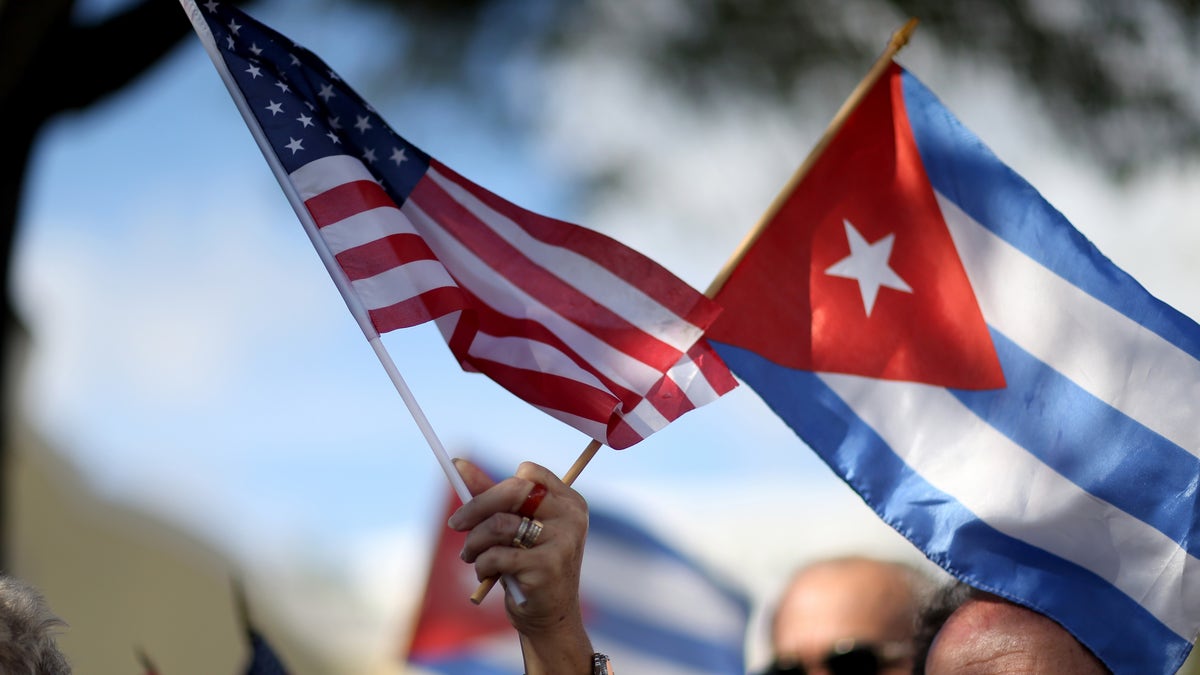
MIAMI, FL - DECEMBER 20: A protester holds an American flag and a Cuban one as she joins with others opposed to U.S. President Barack Obama's announcement earlier in the week of a change to the United States Cuba policy stand together at Jose Marti park on December 20, 2014 in Miami, Florida. President Obama announced a move toward normalizing the relationship with Cuba after a swap of prisoners took place. (Photo by Joe Raedle/Getty Images) (2014 Getty Images)
St. Petersburg, Russia (EFE) – Russian President Vladimir Putin said Saturday that he views the rapprochement between Cuba and the United States as a positive step, while he declined to comment on the situation in Venezuela, citing Russia's custom of non-intervention in the internal affairs of other nations.
Putin, who agreed to an interview with the presidents of the world's 12 largest news agencies, including EFE, began the session with an apology for having arrived four hours late.
"I want to apologize that we have gone past midnight, but you already know why it has happened. It has to do with the desire of my colleagues who came to the (St. Petersburg International Economic) Forum to discuss various subjects. And it is difficult to interrupt meetings," he told the assembled news agency presidents.
The initial minutes of the exchange were broadcast live on Russian television, but the bulk of the encounter took place behind closed doors, without any recording devices.
Asked about Latin America, Putin said it is a priority for Russia and that Moscow intends to pursue expanded and political collaboration with the countries in the region.
He was unwilling to directly address the political conflict in Venezuela, or the international efforts on behalf of jailed Venezuelan politicians.
The Russian leader stressed that it has always been Moscow's policy to respect the internal decisions of other nations.
On Cuba, however, he offered explicit support for Cuba's opening to the world and the diplomatic thaw between Havana and Washington.
Noting the suffering of the Cuban people from the U.S. economic embargo imposed in 1962, he said the end of the embargo would be positive for the island and for the rest of the hemisphere, giving short shrift to the notion that closer ties between Havana and Washington could diminish Russian influence in Cuba.
The increase in belligerent rhetoric between Russia and the U.S. does not mean the world is at greater risk of nuclear confrontation, Putin said.
The issue is one of correcting errors, he said, referring to the fact that Russia had to respond by saying that it would install 40 additional nuclear missiles after the U.S. announced plans to increase its military presence, including heavy artillery, in Eastern Europe.
Russia is not an aggressor and does not favor increasing the level of tension, Putin stressed, but is obliged to respond to Western actions targeting Moscow.
The Russian head of state also answered questions about the crisis in Ukraine, which has led the U.S. and the European Union to impose sanctions on Moscow.
The events of February 2014 in Kiev constituted a coup d'etat against the legitimate government and when the mainly Russian-speaking residents of eastern Ukraine rose up against the new administration, officials in the capital responded by sending tanks, Putin said, describing the move as unacceptable.
He called for implementation of the Minsk accords and accused Kiev of trying to strangle the economies of the eastern rebel regions of Donetsk and Lugansk by withholding payment of pensions and blocking financial transactions.
The international community should exert pressure on the government of President Petro Poroshenko to comply with its obligations under the Minsk agreements, the Russian leader said, denying once again the accusations of Kiev and the West that Russia has troops in eastern Ukraine.
Putin said Russia will defend its interests in the face of the decision by some European governments to freeze Russian state assets on their territory in connection with a legal dispute.
"There cannot be no reaction," he said of the asset freezes implemented by some governments because Moscow has ignored an arbitration court's order to pay more than $50 billion to former shareholders of nationalized Russian oil company Yukos.
Quizzed about how Russia will defend its interests in the matter, Putin replied: "That question needs to be asked of the jurists, they are the ones who will act."
Regarding the FIFA corruption scandal and questions about the awarding of the 2018 World Cup to Russia, Putin said the Russian candidacy prevailed through "legal means" and that a rival bid from Britain failed because the "United Kingdom did not show all the potential it should have."
"We don't think we're guilty of anything," he insisted. "If someone has evidence, let him present it. We won fairly and we are going to host the World Cup. Any other decision would be unfair. The construction of the stadiums has started and the Cup is very soon."




